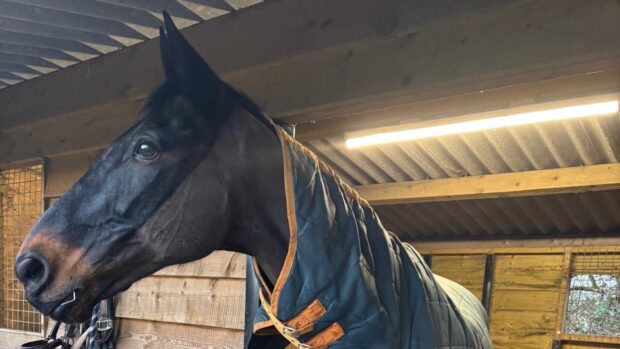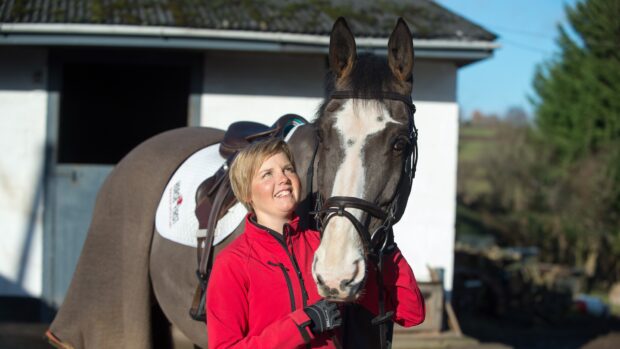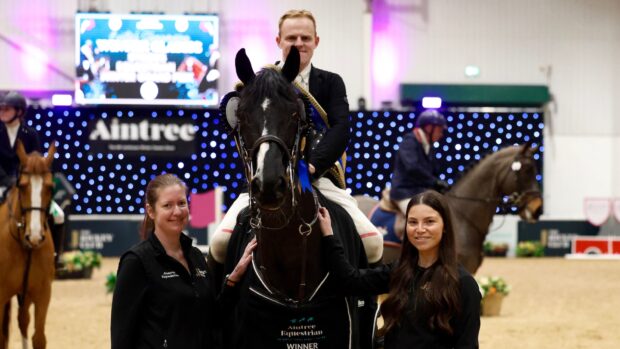Lucinda Green MBE was a masterful event rider of her time with an outstanding talent for getting the best out of multiple horses. Her incredible list of achievements in the sport include six Badminton wins on six different horses, an Olympic silver, 1982 world champion, twice European champion.
“I was very lucky in that I had two attributes, both God given,” she says. “One was good balance and the other was a quick speed of reaction. Both those things are pretty crucial to riding in general, but especially at a high level.”
Yet she modestly admits that she’s unsure she would be good enough to compete in the sport at the highest level today.
“I am under no illusions,” says the eventing legend. “I was never good at dressage. And I don’t think I would be able to improve enough, even though I understand it better now. Your body doesn’t always do what it should and you need to be able to absorb plenty of movement.”

Lucinda Green (then Prior-Palmer) riding Be Fair on the way to gold at the European Eventing Championships at Luhmühlen in 1975.
Lucinda Green on the influence of dressage
In Lucinda’s view, the dramatic improvement in dressage standards over the years has not had a positive impact on the sport as a whole.
“‘In dressage you can continue to improve your score, but you cannot improve on a double zero in the other two phases,” she says. This, along with the end of traditional long-format horse trials in 2005, has caused a paradigm shift in the sport.
“To me it’s increasingly obvious that we are not developing the right type of horses in eventing now, because the dressage is too influential,” she continues. “Dressage horses are being trained to go cross-country instead of the other way around. These horses can have a slower reaction speed and often lack the stamina to handle ground that is not perfect.”
“Bring back the steeplechase,” says Lucinda
While admiring the high quality of riding being seen across all three phases, Lucinda believes the sport would benefit from the return of the steeplechase phase, putting the emphasis back on to the horse’s stamina and ability to gallop. The art of getting horses properly fit would also come to the fore once more. The importance of fitness is key in the current social climate where footage of tired horses gives ammunition to those who believe we should not use horses in sport.
“The animal rights extremists have the same fire in their belly about stopping us as many of us have about the sport continuing in the right vein with the right horses,” Lucinda says. “It’s not easy to find the balance, but our sport’s USP is cross-country – it’s for the cross-country that we all do it.”

Lucinda Green riding Be Fair to win Badminton in 1973.
The days of seeing Lucinda’s famous pale yellow colours in competition may have passed – “I haven’t found a horse good enough to accommodate my shortcomings these days to compete” – but she still enjoys riding and loves being involved in the “making” of horses, helping them learn to trust their riders.
She was recently involved in the education of her daughter Lissa Green’s ride Go On Biats, who has just completed the seven-year-old young horse World Championships at Le Lion d’Angers with a clear cross round cross-country inside the time.
“He’s got a very appropriate name because I spent most of the last year trying to teach him that ‘go on’ meant ‘go on’,” Lucinda explains, “I think he was taken a bit fast in France at 90cms and was frightened – all he wanted to do when he saw a jump was stop dead 20 yards away. He was awfully nappy. Lissa handed him over to me because I was the one who had the time.”
Turning tricky horses around
While saying that she “certainly won’t ride anything that doesn’t behave”, Lucinda’s patience and skills have paid off 10-fold with Go On Biats.
“Often when he stopped at whatever, I stopped and we just waited. If I smacked him, he kicked and I was worried I would fall off. I do not need to be bucked off. I’ve hit my head too many times,” she says. “One of the things he never worked out was how to stop when he was going backwards – often I would half circle him around in reverse until he was back past the thing he would not go past.”
Lucinda also spent much time trotting, or even walking around cross-country courses: “The main thing was he had to arrive on the other side of whatever little obstacle he faced, no matter how long it took.
“He’s turned the most magnificent corner because of that foundation, which was confirmed by a month’s hunting with Tony Pellet at the Beaufort. He is even quite cocky now. He’s gone from trotting around a BE100 in April with Lissa to Lion d’Angers. This is very quick progress. We are permanently aware that he might have gone too quick, that we might have to steady up and fill some gaps should they appear. It will be intriguing to watch his progress with Lissa, who is now very attached to him.”
The power of virtual training
As Lucinda approaches her 70th birthday, her passion for sharing her cross-country skills remains undiminished. And while she does still train riders in person at a limited number of clinics around the world, her techniques and philosophies – including her “Greenprint” and famous “ready for trouble” position – have now been made available to the masses via an online academy, which she has set up with Canadian Olympic rider Rachel Faulkner.
“I didn’t think you could teach cross-country virtually, but it’s extraordinary how much you can convey,” Lucinda explains.
Academy members also have access to a dedicated Facebook group, which Lucinda says is “full of people helping each other – it’s a lovely community. Unless some of your family rides, it can be quite a lonely existence and now, suddenly, you have a heap of like-minded people who can help you when you are stuck, because – let’s face it – with horses you are stuck plenty of the time.”
So while it is unclear what direction the sport may take in the future, you can be sure that Lucinda’s “God-given” talent will continue to influence riders – and their horses – for many, many years to come.
Did you enjoy reading this exclusive interview with Lucinda Green? We used the support we receive from our website subscribers to create this article. If you’d like to support our work, enabling us to invest in even more exclusive journalism like this – as well as enjoying unlimited access to our online breaking news service, expert opinion and event analysis, our extensive vet library, plus training advice, you can subscribe today from as little as £1 a week*. View offers.
*Annual subscription billed today as £52 for 1 year. Renews automatically after first year at standard price £87.99, and we will notify you of any price increases in advance. Cancel auto-renewal at any time.
Read more about Lucinda Green…

‘I don’t really believe it was me’: Lucinda Green reflects on her six Badminton victories 50 years since the first

Regal Realm: from Australian stock horse to Badminton winner and world champion

Lucinda Green named worthy winner of Horse & Hound lifetime achievement award
“What I’ve done with my life has been a huge and exciting journey with the help of so many people”

Fun, focus and footwork: must-have cross-country riding advice from Lucinda Green
Improve your cross-country skills with advice from the six-time Badminton winner — from being flexible with bits to making sure




